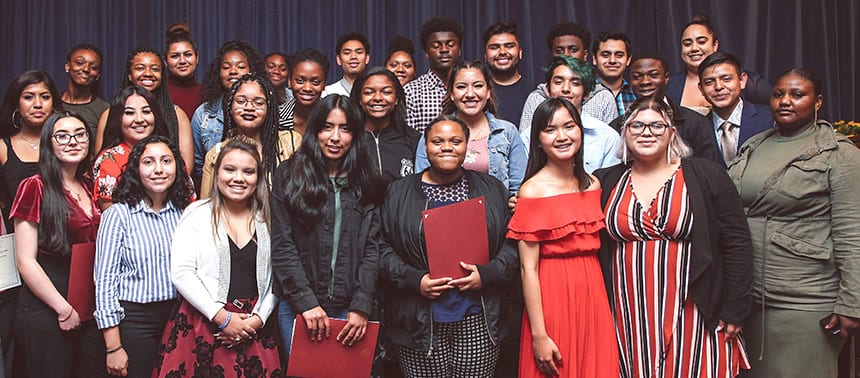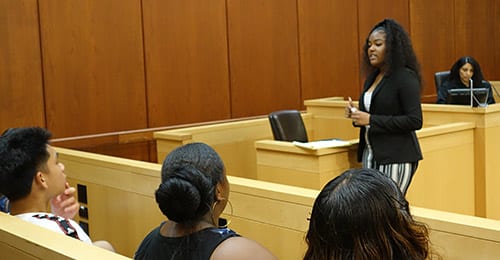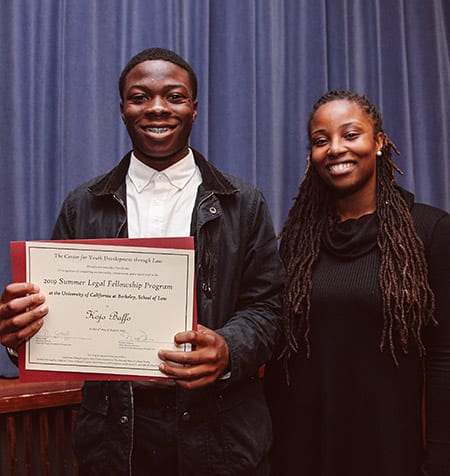
By Andrew Cohen
While Berkeley Law manifests its public mission in many ways, one of the most inspiring is the Center for Youth Development through Law program.
Every summer, a group of area high school students from disadvantaged backgrounds immerse themselves in paid law-related internships and classes at Berkeley Law that integrate a legal curriculum with life and leadership skills. CYDL recently celebrated its 20th anniversary at the school with two mock trials and a graduation ceremony.
Several Berkeley Law alumni serve on the program’s board of directors, Dean Erwin Chemerinsky gave a talk to the 30 students in this year’s cohort, and a number of faculty members sit on the advisory committee.
Providing pragmatic course sessions, illuminating work experience, and valuable mentoring, the initiative “shows these promising students a path forward into education and achievement they might otherwise never experience,” says Faculty Advisor and Berkeley Law Professor Catherine Albiston ’93.
“By bringing students into the law school itself, the program allows students to visualize themselves in college and law school classrooms in the future,” Albiston adds. “Graduates repeatedly comment on how being in a law school classroom learning about leadership and law helped them aspire to and believe in a future in education.”
Shedding myths

For participant Aliyah George, now a junior at Castlemont High School in Oakland, the program shattered some long-held beliefs. She interned at the Alameda County Public Defender’s Office, which for years had been a source of frustration.
“A few family members of mine have been convicted and we used to call (the people who represented them) ‘public pretenders,’” George says. “I thought public defenders didn’t work as hard as district attorneys, but working there this summer I saw how swamped they are with cases, how busy they are, and how committed they are to justice.”
Toward the end of her internship, George—whose career goal is to become a lawyer—attended a trial from start to finish. Intrigued by the jury selection process, she saw how what she learned in her weekly summer class sessions at Berkeley Law translated in the courtroom.
“I really liked our Constitution class and our World of Work class,” George says. “That one didn’t just focus on legal careers. We talked about resumes, what to wear to job interviews, the best ways to interact with your supervisor, things like that. We got a lot of great practical advice that will help us in the future.”
George also enjoyed cultivating a network with peers from other East Bay high schools. “We’re all different, but we also come from the same type of background,” she says. “We need more black and brown people in the legal field, and this program is a great way to help increase those numbers. And even if you don’t pursue a legal career, the program is a huge help for whatever work people end up doing.”
Tremendous track record
Since the program’s launch in 1999, more than 92 percent of participants have enrolled in higher education. Director Nancy Schiff coordinates the curriculum to sharpen critical thinking and communication skills, and brings in college advisors and financial aid experts to educate students about how to navigate college applications. The program also provides follow-up mentoring.

“Everyone who meets our students comes away inspired—by their enthusiasm, wisdom, and perseverance in the face of overwhelming challenges,” Schiff says. “They’re eager to learn about law, both to empower themselves and as a way to fight injustices they see in the world around them. Our program alumni have gone on to become educators, social workers, community activists, and attorneys, helping to build a more equitable and inclusive community for all of us.”
The CYDL program is one of several ways in which Berkeley Law engages with high school and younger area students. Just two other examples:
Clinical Professor Ty Alper leads a semester-long mock trial program for a 5th grade class at Berkeley’s Rosa Parks Elementary School, capped by a mock trial at the law school before an actual judge. Berkeley Law students have also provided mentoring and classroom sessions on the 4th Amendment, immigration law, and other timely issues for students from a local high school law and public service academy.
“Berkeley Law has a long tradition of civic engagement, public service, and educational opportunity for all,” Albiston says. “CYDL is an important means for the law school to engage with disadvantaged high school students in our immediate community on all these measures.”